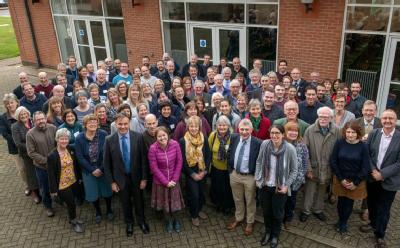Life Sciences News
See our Latest Journal Publications
Minimum energy requirements for microbial communities to live predicted
 A microbial community is a complex, dynamic system composed of hundreds of species and their interactions, they are found in oceans, soil, animal guts and plant roots. Each system feeds the Earth’s ecosystem and their own growth, as they each have their own metabolism that underpin biogeochemical cycles.
A microbial community is a complex, dynamic system composed of hundreds of species and their interactions, they are found in oceans, soil, animal guts and plant roots. Each system feeds the Earth’s ecosystem and their own growth, as they each have their own metabolism that underpin biogeochemical cycles.
Professor Orkun Soyer and colleagues have produced a thermodynamic model for simulating the dynamics of microbial communities.
UKRI fellowships awarded to Life Sciences Academics
Two academics from Life Sciences have been awarded a UKRI Future Leader Fellowship.
- Dr Byron Carpenter for his project titled: Developing a synthetic signalling system capable of the precise spatial and temporal control of protein function in living cells.
- Dr Erin Connelly for her project: Datamining medieval medical texts for modern medicines.
The fellowship scheme is awarded to the best researchers in the UK, keeping research and innovation in the UK world class.
Warwick Researchers to provide COVID-19 Intervention Modelling for East Africa (CIMEA)
 A £1m grant from the Wellcome Trust has enabled researchers to work with East African countries in their emergency preparations for COVID-19 as the pandemic spreads across Africa. Press Release
A £1m grant from the Wellcome Trust has enabled researchers to work with East African countries in their emergency preparations for COVID-19 as the pandemic spreads across Africa. Press Release
Professor James Nokes comments:
'We hope that by closely combining our efforts with in-country expertise in modelling, epidemiology, health economics and systems and vulnerability mapping we can develop models appropriate to each setting with results that will immediately feed into the policy making process to have the greatest impact.'
Impact of marine carbon on climate change to be investigated by Warwick Scientists
 185 scientists won part of the European Research Council’s (ERC) €450 million for Europe’s long-term frontier research, one of which was Professor David Scanlan, from the School of Life Sciences.
185 scientists won part of the European Research Council’s (ERC) €450 million for Europe’s long-term frontier research, one of which was Professor David Scanlan, from the School of Life Sciences.
Microbial interactions in aquatic environments to be investigated
 The microbes found in aquatic environments and their interactions will be investigated by Warwick researcher Professor Orkun Soyer, thanks to an investigator award from The Gordon and Betty Moore foundation.
The microbes found in aquatic environments and their interactions will be investigated by Warwick researcher Professor Orkun Soyer, thanks to an investigator award from The Gordon and Betty Moore foundation.
Arctic's Global Seed Vault to receive 1000 types of seeds from Warwick's Vegetable Genebank
Just under 1000 seed samples from different crop species including kale, carrots and cauliflower are to be deposited at the Svalbard Global Seed Vault in Arctic Norway on Tuesday 25 February 2020, from the UK Vegetable Genebank (UKVGB) at the University of Warwick Wellesbourne campus.
Warwick ranked as one of UK’s top 3 Universities for “High Flier” graduates most sought after by leading employers
Leading employers have ranked the University of Warwick as one of UK’s top three universities for “High Flier” graduates most sought after.
How sand fly mating habits are helping tackle tropical disease in £2.5M project
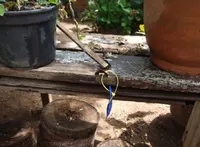 The tropical disease Leishmaniasis is being tackled by catching female sand flies who carry the parasite that causes the disease. Scientists led by Dr Orin Courtenay of Warwick University and Professor Gordon Hamilton of Lancaster University, developed the concept as part of a £2.5M project funded by The Wellcome Trust and published in PLOS Neglected Tropical Diseases.
The tropical disease Leishmaniasis is being tackled by catching female sand flies who carry the parasite that causes the disease. Scientists led by Dr Orin Courtenay of Warwick University and Professor Gordon Hamilton of Lancaster University, developed the concept as part of a £2.5M project funded by The Wellcome Trust and published in PLOS Neglected Tropical Diseases.
Superbugs, stem cells and more at University of Warwick’s showcase of science
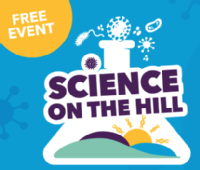 Whether you are fascinated by superbugs, stem cells, or circadian rhythms, a new programme of free events from the University of Warwick will give you the ideal vantage point on biological and medical science.'Science on the Hill' is a new programme of public engagement events jointly hosted by the School of Life Sciences and the Wellcome-Warwick Quantiative Biomedicine Programme at Warwick Medical School. These interactive two hour events taking place across the academic year will feature 20 researchers giving a birds-eye view of the latest exciting developments in their discipline.
Whether you are fascinated by superbugs, stem cells, or circadian rhythms, a new programme of free events from the University of Warwick will give you the ideal vantage point on biological and medical science.'Science on the Hill' is a new programme of public engagement events jointly hosted by the School of Life Sciences and the Wellcome-Warwick Quantiative Biomedicine Programme at Warwick Medical School. These interactive two hour events taking place across the academic year will feature 20 researchers giving a birds-eye view of the latest exciting developments in their discipline.
Over £20 million government award marks Midlands’ bio-economy strengths
A consortium of Midlands research-active universities has just been awarded research studentships worth over £20 million to build on the Midlands’ already significant bio-economy and success in life sciences and agricultural research.
The Midlands Integrative Biosciences Training Partnership 2020 (MIBTP2020) is led by the School of Life Sciences at the University of Warwick and brings together a number of other Warwick research departments, in partnership with the University of Birmingham, the University of Leicester, Aston University and Harper Adams University. The funding comes from the Biotechnology and Biological Sciences Research Council arm of the Government’s UK Research and Innovation (UKRI) funding organisation. This award will be matched by the universities in the partnership to fund a total of 245 doctoral students (59 per year) over the next 5 years.
Tracking Alzheimer’s disease pathology in single neuronal cells
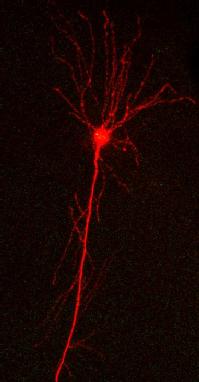 Researchers have developed a superior method to describe the very earliest effects that Alzheimer’s Disease proteins have on the properties of brain cells.
Researchers have developed a superior method to describe the very earliest effects that Alzheimer’s Disease proteins have on the properties of brain cells.
In the paper ‘Introduction of Tau oligomers into cortical neurons alters action potential dynamics and disrupts synaptic transmission and plasticity’ published in the journal eNeuro. Researchers directly identify new therapeutic targets and describe a new standard for future research activity.
Warwick rises a further two places to 77th in the THE World University Rankings
The University of Warwick has risen two places to 77th overall in the THE (Times Higher Education) 2019 World University Rankings published on the evening of Wednesday 11th September 2019. This rise is in addition to Warwick’s leap of a dozen places in the 2018 table.
National livestock movement bans may prove economically damaging
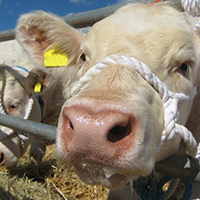 New research led by Dr Mike Tildesley has pioneered an economic perspective on controlling livestock diseases. Focusing on Foot and Mouth Disease (FMD), bovine TB (bTB) and bluetongue virus (BTV), the researchers draw striking conclusions about the role of movement bans in controlling an outbreak.
New research led by Dr Mike Tildesley has pioneered an economic perspective on controlling livestock diseases. Focusing on Foot and Mouth Disease (FMD), bovine TB (bTB) and bluetongue virus (BTV), the researchers draw striking conclusions about the role of movement bans in controlling an outbreak.
New awards target breakthrough technologies to enhance food security
A recent collaboration between the BBSRC, the National Science Foundation (NSF) and the US Department of Agriculture's National Institute of Food and Agriculture (NIFA) is helping researchers potentially advance technology that brings more security to crop agriculture of the future. Dr Stephen Jackson and Dr Jose Gutierrez-Marcos are amongst those receiving funding.
Warwick Ranked in UK Top 10 and World Top 100 by QS
The University of Warwick has been named as one of the UK’s top ten, and one of the world’s top 100, universities by the QS World University Rankings.
Bacteria such as E. coli detected in minutes by new technology
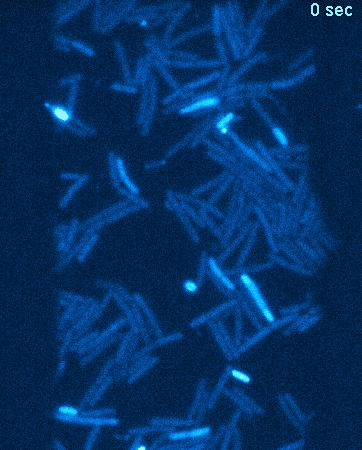 Dr Munehiro Asally, Dr James Stratford and colleagues, showed that bioelectrical signals from bacteria can be used to rapidly determine if they are alive or dead.
Dr Munehiro Asally, Dr James Stratford and colleagues, showed that bioelectrical signals from bacteria can be used to rapidly determine if they are alive or dead.
The findings offer a new technology which detects live bacteria in minutes instead of waiting for lab-test results which can take days.
When 'zapped' with an electrical field, live bacteria absorb dye molecules, causing the cells to light up and allowing them to be counted easily.
This rapid technique can detect antibiotic-resistant bacteria.
Beer and fodder crop has been deteriorating for 6000 years
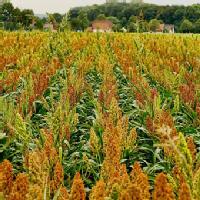 The diversity of the crop Sorghum, a cereal used to make alcoholic drinks, has been decreasing over time due to agricultural practice. To maintain the diversity of the crop and keep it growing farmers will need to revise how they manage it. According to Professor Allaby and colleagues, different groups of sorghums have ‘rescued’ each other from damage, giving insight into how such crops could be rescued in the future.
The diversity of the crop Sorghum, a cereal used to make alcoholic drinks, has been decreasing over time due to agricultural practice. To maintain the diversity of the crop and keep it growing farmers will need to revise how they manage it. According to Professor Allaby and colleagues, different groups of sorghums have ‘rescued’ each other from damage, giving insight into how such crops could be rescued in the future.
The milkweed bug’s orange wings and DNA: how insects’ diets are revealed by the genome
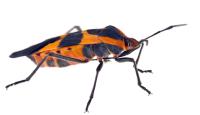 An international collaboration of researchers, including Dr Kristen Panfilio from the School of Life Sciences, have sequenced the genome of the milkweed bug, enabling scientists to understand at the molecular level what makes the bug, from its colourful development to its toxic diet.
An international collaboration of researchers, including Dr Kristen Panfilio from the School of Life Sciences, have sequenced the genome of the milkweed bug, enabling scientists to understand at the molecular level what makes the bug, from its colourful development to its toxic diet.
Salmonella could be combated by enhancing body’s natural process
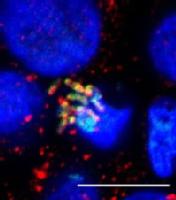 Autophagy – the process of recycling cellular material in the body, can help combat Salmonella and other pathogens according to Dr Ioannis Nezis and colleagues who have studied how autophagy can get rid of bacteria, and prevent diseases developing.
Autophagy – the process of recycling cellular material in the body, can help combat Salmonella and other pathogens according to Dr Ioannis Nezis and colleagues who have studied how autophagy can get rid of bacteria, and prevent diseases developing.

